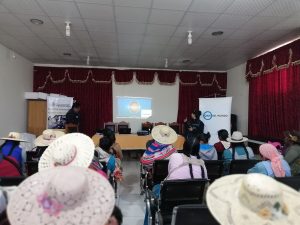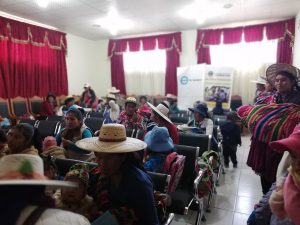
In its fight to combat avoidable blindness and within the framework of its gender strategy 2018 – 2020, Eyes of the world has as one of its priority axes the promotion of the individual and collective empowerment of women. In this regard, the Eyes of Bolivia programme has given a leading role to Tarija and Oruro women to encourage good eye health habits in their local communities. Raising people awareness of the importance of equitable access to eye health is a step further towards opening their eyes not only to the world, but also to their minds.
Since July 2019, Eyes of the world has been present in Vinto, one of the biggest peri-urban areas of Oruro. The intervention began with the training of the staff of the Vinto Health Centre where teachers were trained in visual acuity and students in awareness in Vinto School. Since August, 42 women have volunteered to meet monthly at the Health Center in order to be trained in eye health promotion. In the case of the Tarija Department, the number of female promoters is of 322.
This motivation to acquire basic knowledge on eye health derives from the reaction of some women, who have realized they have problems related to eyesight, but as mothers, they have left them relegated to second place because they prioritize the health of their children, husbands and other relatives. Empowering women with basic knowledge is intended with the aim of ensuring they do not underestimate their eye health and engage in decision-making in this field.

This group of women played a leading role at the Eye Health Fair which was organized last October 10 in Vinto, on the occasion of the World Sight Day where they exposed information panels to publicize the main pathologies and teach good habits on eye care.
The goal is to create a community eye health surveillance network that will give priority to these women not only in promotional measures, but in all the stages previous to the surgical intervention of people who need it. For example, they will be in charge of identifying people with eye diseases in their communities to refer them to the health center, they will support the follow-up of the patients’ treatments and they will carry out awareness actions at schools to train teachers in visual acuity examinations and lenses measurement.
Moreover, it is intended these women take part in the analysis meetings of health centers so that they get involved and have a voice in decision making. Above all, it is highlighted their importance in inclusion strategies to enable women’s access to eye health.